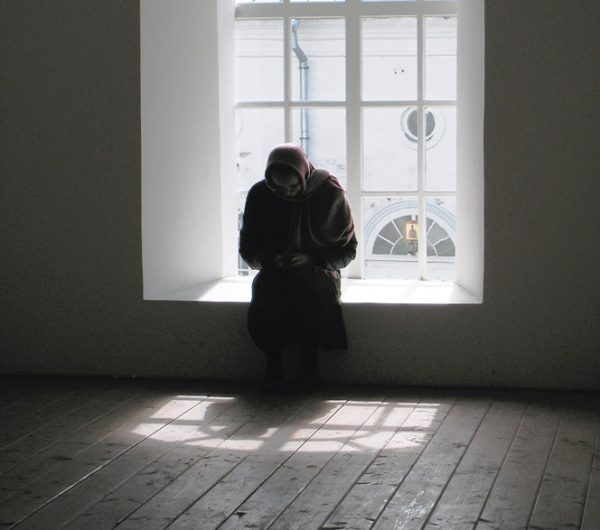God is joy. Secular life is sorrow. For forty years, as though the presence of God were a toxin in our culture, schools and public square, many of America’s leaders have been zealously working to detoxify our land. Not surprisingly, the more secularized we have become the more sorrowful we have become. Now here is an amazing disconnect. Why is it that America has never been so Christian[1] and yet so joyless? A greater percentage of our population identifies itself as Christian than at any time in our nation’s history, yet we are by all observable phenomena radically depressed. How are we to explain such an anomaly?
The normal state of internal affairs for Christians is expressed by St. Peter, “Jesus Christ, whom having not seen you love. Though now you do not see Him, yet believing, you rejoice with joy inexpressible and full of glory.” (1 Peter 1:8). Prozac is no substitute for joy inexpressible. While there are many contributors to this epidemic of joylessness I would like to suggest the primary cause: isolation.
Joy and the Presence of God. Joy is an attribute of Almighty God. He is joy, and the joy of His people. “Oh, send out Thy light and Thy truth! Let them lead me; Let them bring me to Thy holy hill and to Thy tabernacle. Then I will go to the altar of God, to God my exceeding joy” (Ps. 43:4). God is joy, and to draw near to God is to draw near to joy. “Thou shalt show me the path of life; In Thy presence is the fullness of joy; At Thy right hand are pleasures forevermore” (Ps. 16:11). It may be obvious to many, but in my pastoral experience it needs to be repeated that the primary cause of depression is being far from God. It is the absence of God that elicits within us the greatest grief. Joy is not the absence of sorrows. Joy is the presence of God in all these things. It is our perception that we are alone in the midst of our pains that is the source of our greatest sorrow. When God is there all of our difficulties are infused with a mysterious joy. When He is not, even our greatest earthly happiness is unsatisfying.
When we endure the crosses of this poor life without the knowledge that God is in them all, and has sent them to us in His providence from the abundance of His love designed for our salvation, then these very crosses kill us. They provoke within us a great despair, and this despair, according to St. John Chrysostom, is the greatest of the tools of the evil one.
These things need not be. An icon of inexpressible joy offered by God to the world in contemporary times is the life of St. Seraphim of Sarov (1759-1813).[2] All of the saints of God, by being God-bearers, carried in their bosoms unbounded joy and passed it to all who gathered around them. St. Seraphim, however, was exceptional. Though he was a monk he chose not to don the traditional black cassock, but wore throughout the year a white one. Rather than saying “Christ is risen” only for the forty days of Pascha, as is customary, he employed this greeting every day of the year. He greeted his visitors, which included the likes of the Tsar and Tsaritsa of Russia, universally as “My joy.”
His entire life was spent in the quest to acquire the Holy Spirit. “Ask, and it will be given to you; seek, and you will find; knock, and it will be opened to you…if you know how to give good gifts to your children, how much more will your heavenly Father give the Holy Spirit to those who ask Him” (St. Luke 11:9, 13). St. Seraphim knocked. For 1,000 days and nights he remained upon a rock in prayer. St. Seraphim asked and St. Seraphim received. The Holy Spirit came upon him in great measure, and the fruit of the Spirit’s presence was inexpressible joy. “For the fruit of the Spirit is love, joy, peace…” (Gal. 5:22).
In the famous Conversation St. Seraphim explains to his spiritual son Motovilov:
‘When the Spirit of God descends on a man, and envelops him in the fullness of his presence, the soul overflows with unspeakable joy, for the Holy Spirit fills everything he touches with joy…This is that joy of which the Lord speaks in His Gospel: ‘A woman when she is in travail has sorrow, because her hour has come; but when she is delivered of the child, she remembers no more the anquish, for joy that a man is born into the world. In the world you will be sorrowful; but when I see you again, your heart will rejoice, and your joy no one will take from you.” (Jn. 16:21-22). If the first-fruits of future joy have already filled your soul with such sweetness, with such happiness, what shall we say of the joy in the Kingdom of Heaven, which awaits all those who weep here on earth?…Then this transitory and partial joy which we now feel will be revealed in all its fullness, overwhelming our being with ineffable delights which no one will be able to take from us.”[3]
Overcoming Isolation from God. The path to overcoming isolation from God begins, continues, and ends with repentance. The first word spoken by our Savior in His public preaching was: “Repent!” (St. Matt. 4:17). Likewise, His last words to His Apostles prior to His Ascension were that “repentance and remission of sins should be preached in His name to all nations” (St. Luke 24:47).
Now some readers may be thinking to themselves that this article was supposed to be about joy not the tears of repentance. But any dichotomy between the two is false. There is no joy without repentance, and there is no true repentance that is not followed by, and indeed infused with, great joy. This divine union of repentance and joy is no more clearly set forth than in the Psalm of Repentance par excellence, Ps. 50 (LXX). This prayer of heartfelt repentance was authored by King David as an offering to God following his tragic fall into adultery and murder. The repentance modeled in Psalm 50 is the balm of healing and restoration of joy for ruined consciences and broken hearts to this very day. Repentance is the divine prozac. “Have mercy on me O God!” Blot out my transgressions! I have done evil in Thy sight! Create in me a clean heart O God! And then comes the joy. “Make me to hear joy and gladness, that the bones which Thou hast broken may rejoice…Restore to me the joy of Thy salvation.”
Repentance is the restoration of inexpressible joy. There is no more expedient path to joy than sustained repentance. Christians know by experience that joy is not the polar opposite of sorrow, but its transformation. Charmolypi (Χαρμολύπι) is the character of the Christian. This word, charmolypi, is found in the work of St. John of Sinai,[4] the author of the Ladder of Divine Ascent, and was probably coined by him. It means “joyful sorrow” or “bitter joy” and it is the normative spirit of the Christian. Young children model this charmolypi when, in the midst of a crying spasm, with tears running down their faces, they catch a glimpse of their mother staring lovingly at them, and then they break into laughter. Tears, laughter, tears, and laughter are meshed together and soon all comes to calm. So it is with the repenting Christian, who perceives the gaze of His loving heavenly Father. Our tears become infused with joy.
The Modern Abandonment of Repentance. Now if repentance is the path to joy, a culture that does not repent is going to be joyless. The priest’s confessional has been abandoned as the psychologist’s couch has been embraced. Today Catholic priests have a few hours a week slotted for confessions when just fifty years ago whole days were taken up with the task. Most Catholics simply are not confessing. American Orthodox Christians are not much better. Most Protestants have not historically practiced private confession, but have in their tradition an emphasis on self-examination and repentance, but today ‘repentance’ is not viewed as “seeker-friendly” in Protestant churches.[5]
The joy of the Resurrection follows the agony of the Crucifixion. The joy of the Christian life is the fruit of repentance. Repentance removes our isolation. Practice regular confession and your life will change for the better. For the next year read a prayer of repentance for your sins every evening before retiring. Then do a thorough examination of your conscience once a month and make confession. In so doing you can expect to be divinely stabbed with the joy inexpressible.
[1] Samuel Huntington (2004) Who are We? The Challenge to America’s National Identity, Simon and Schuster:New York, pp. 352-357.
[2] If the reader has never read St. Seraphim’s life I encourage you to do so. There are several excellent lives of St. Seraphim in the English language, and I highly recommend Archimandrite Lazarus Moore’s (1994) St. Seraphim of Sarov: A Spiritual Biography, New Sarov Press:Blanco,Tx.
[3] Boosalis, Harry (1993) The Joy of the Holy, St. Tikhon’s Seminary Press: South Canaan, PA., p. 82.
[4] St. John (A.D. 570-649) was the Abbot of the Monastery of St. Catherine onMt.Sinai.
[5] Confession alone to God with your head on the pillow is simply deficient repentance. St. James 5 makes it abundantly clear that we are required to confess to another human being, and the human beings St. James mentions in this context are presbyters.
By Father Josiah Trenham This article first appeared in SEEN: The Journal of CIVA- Christians in the Visual Arts, Vol. V 2005, pp. 10-11
















